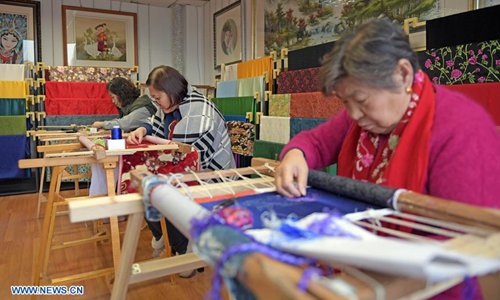ARTS / CULTURE & LEISURE
Cultural inheritor opens classes to save endangered Manchu language

Technicians work in a Manchu embroidery studio in Shenyang, capital of northeast China's Liaoning Province, Nov. 23, 2018. Photo: Xinhua
A Manchu language inheritor said on Tuesday that only about 200 to 300 people in China are able to speak the critically endangered language.Tan Shanshan, a 33-year-old language inheritor whose ancestor belongs to the Plain White Banner, one of the eight banners of Manchu military and society, has opened online and offline Manchu classes in Ningguta, Northeast China's Heilongjiang Province, to try to save the endangered language.
Spoken by the Manchu, one of China's ethnic minority groups, the language originated from the region between China and the Korean Peninsula. It was one of the official languages of the Manchu-led Qing Dynasty (1644-1911) and was spoken among the people in court and bureaucracy as a symbol of their advanced hierarchy. However, after the end of the Qing Dynasty, the prominence of the Manchu language declined.
While there are nearly 10 million Manchus in China, most of which living in provinces in Northeast China, a large majority speak Putonghua (Standard Chinese). According to UNESCO's Atlas of the World's Languages in Danger in 2016, only 20 people in the world still spoke Manchu.
"My passion for Manchu is not only to learn the language well, but also to get more people speaking and writing in Manchu. I do not want it to exit the world forever," Tan said in an interview with Chinese media outlet Pear Video on Tuesday.
The hashtag for the classes earned 160 million views on China's Twitter-like Sina Weibo on Tuesday, with many Chinese netizens saying they support the conservation of China's ethnic minority languages.
"I feel ashamed when someone asks me if I can speak Manchu. I hope one day I can speak it fluently," one ethnic Manchu student who asked to remain anonymous told Pear Video.
"I think it is a good idea to open Manchu language classes because people who are interest in the culture might learn more when they master the language," Zhou Wei, a teacher at Tianjin Foreign Studies Universities who is Manchu on her mother's side, told the Global Times on Tuesday.
But Zhou also pointed that Manchu language learning tends to be more research-oriented since only a few people can speak it and it is difficult to learn.
According to the report from news outlet china.com.cn, the Manchu alphabet is based on the Mongolian alphabet and is written from top to bottom. Manchu letters are written vertically from top to bottom with columns going from left to right.
"I personally think the language's research value is much higher than its usage value. We need to record the language system including the pronunciation of words, grammar and some special usages. But if we take it as a kind of cultural renaissance, that would be a useless effort," Zhou said.




